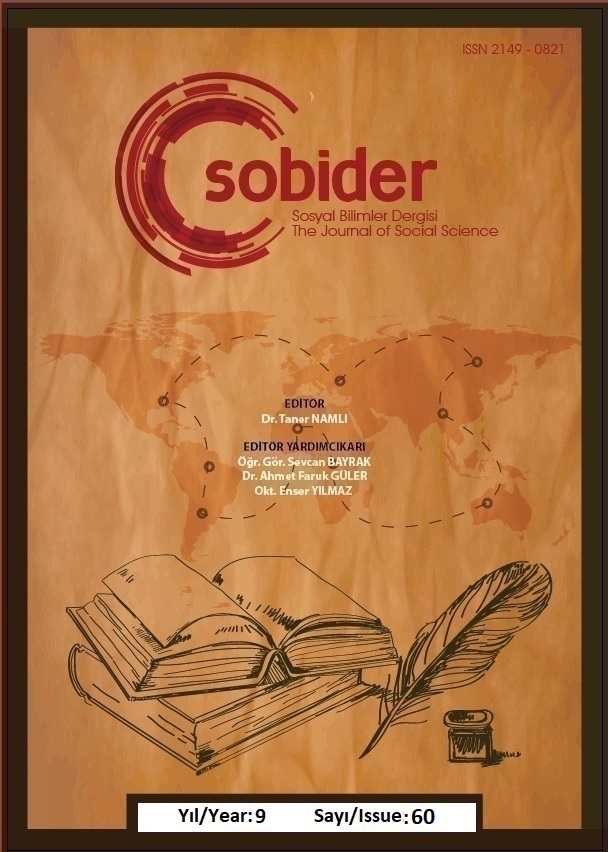Author :
Abstract
Hakikat ötesi çağ, dijital kültür, post-hümanizm ve sanal gerçeklik gibi anahtar kelimelerin birlikte çokça anıldığı 21. yüzyılda teknolojiye bağlı olarak gelişen ve hızlı bir şekilde değişen-dönüşen insan üretim ve tüketim anlayışı bireyin yaşam biçiminde dramatik değişikler meydana getirmiştir. Böylesi bir dönemde araştırma alanı kültür olan halk bilimi disiplini de halk bilgisi ürünlerini tahlil etmede faydalandığı araç-gereç ve yöntemleri değiştirme-dönüştürme eğiliminde olmuştur. Ancak, bu eğilim bazı noktalarda yetersiz kalmakta ve yeni kültürel aktarım ortamlarındaki halk bilgisi ögelerinin tahlilinde yöntem sorunları ortaya çıkmaktadır. Halk bilimi araştırmalarının 21. yüzyıldaki durumunu değerlendirmeyi amaçlayan bu makale yeni yönelimler ve araştırma yöntemlerini ele alarak halk bilimi çalışmalarının güncel durumunu tespit etme ve yeni konu önerileri sunma amacına sahiptir. Makalede çağımızda halk biliminin kimi ve neyi araştırdığı/ araştırması gerektiği, “gelenek” kavramının günümüzde neyi ifade ettiği, evrensel folklor anlayışı ve üzerine çalışma yapılması gereken güncel konular hakkında tartışmalar yürütülmüştür.
Keywords
Abstract
The 21st century is often associated with keywords such as post-truth, digital culture, post-humanism and virtual reality. In this century, the understanding of human production and consumption, which has developed and rapidly changed and transformed depending on technology, has brought about dramatic changes in the lifestyle. Correspondingly in such a period, the folklore discipline has also tended to change and transform the methods in analyzing folklore products. However, this tendency is insufficient at some points and methodological problems arise in the analysis of folkloric elements in new cultural transmission environments. This article, which aims to evaluate the situation of folklore studies in the 21st century, focuses to identify the current status of folklore studies and offer suggestions of new research areas in folklore by addressing new trends and research methods. In the article, the scope of folklore in the 21st century, the current meaning of the concept of "tradition", the universal understanding of folklore and current issues are opened to discussion.
Keywords
- Aktepe, Ş., Erol, E. (2019), “Osmanlı Dönemi Gelinlikleri ve Gelin Başlıkları”, The Journal of Social Science (3/3), 339-349.
- Ben Amos, D. (1971), “Toward a Definition of Folklore in Context”. Journal of American Folklore, (84), 3-15.
- Bronner, S. J. (2017), “Uygulamadaki Folklorun Bir Tanımına Doğru”, (A. E. Aral, Çev.), Milli Folklor Dergisi, (113), 93-116.
- Dundes, A. (1998), “Halk Kimdir?”, (M. Ekici Çev.), Milli Folklor Dergisi, (37), 139-157.
- Ekici, M. (2000), “Halk, Halk Bilimi ve Halk Bilgisi Üzerine Bir Deneme”, Milli Folklor, (45), 2-8.
- Ekici, M. (2008), “Geleneksel Kültürü Güncellemek Üzerine Bir Değerlendirme”, Milli Folklor Dergisi, (80), 33-38.
- Glassie, H. (1995), “Tradition”. The Journal of American Folklore, (108/430), 395-412.
- Miner, H. (1956), “Body Ritual Among the Nacirema”, American Anthropologist, (58/3), 503- 507.
- Moran, B. (1994), Edebiyat Kuramları ve Eleştiri, İstanbul, Cem Yayınevi.
- Oğuz, M. Ö. (2009), Küreselleşme ve Uygulamalı Halk Bilimi, Ankara, Akçağ Yayınları.
- Ong, W. J. (2007), Sözlü ve Yazılı Kültür: Sözün Teknolojileşmesi, (S. Postacıoğlu Banon, Çev.), İstanbul, Metis.
- Özdemir, N. (2006), “Yeni/lenmek ve Nevruz”, Milli Folklor Dergisi, (69), 15-27.
- Palmenfelt, U. (2014), “Intellectual Trends and Folklore Research”, Presented at the Mapping Disciplinary History Centers Borderlands and Shared Spaces in Folkloristic Thought, 20-24 October, 2014, Riga, Latvia.
- Rone, S. L. (1967), “Contemporary Trends in Folklore Research”, Latin American Research Review, (2/2), 26-54.
- Thosango, C. M. (1999), “(Un)Changing Theoretical Trends in the Study of Folklore in South Africa”, Critical Arts, (13/2), 81-91.
- Vovk, M. (2017), “Trends in Folklore Studies Development in the Research and Education Space at Ukrainian and Foreign Universities”, Comparative Professional Pedagogy, (7/1), 14-19.
- Yücel, V. (2014). Kahramanın Yolculuğu: Mitik Erkeklik ve Suç Draması, İstanbul, İstanbul Bilgi Üniversitesi Yayınları.
- Zhang, L., You, Z. (2019), “Introduction: History and Trends of Chinese Folklore Studies”, Chinese Folklore Studies Today: Discourse and Practice, 1-26.
- Kemp, S. (2021), “Digital 2021: The Latest Insights into the State of Digital”, 29.09.2021 tarihinde https://wearesocial.com/blog/2021/01/digital-2021-the-latest-insights-intothe-state-of-digital adresinden erişildi.
- Indick, W. (2004), “Classical Heroes in Modern Movies: Mythological Patterns of the Superhero”, 29.09.2021 tarihinde https://www.researchgate.net/publication/327513176_Classical_Heroes_in_Modern_M ovies_Mythological_Patterns_of_the_Superhero adresinden erişildi.
